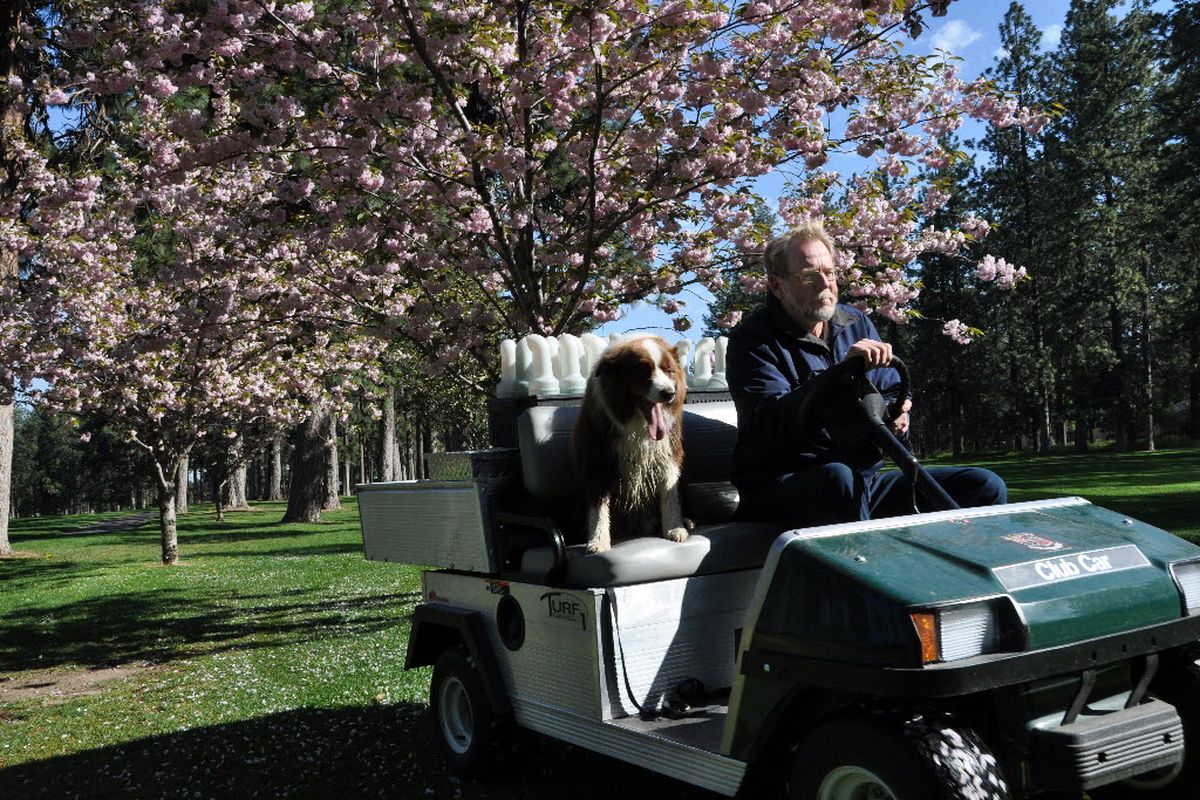Chasing birdies
Collie herds messy waterfowl off golf course

Manito Golf & Country Club has a special agent on staff to keep its greens and fairways goose dropping-free.
He works for room and board, all the pine cones he cares to pack around in his mouth and a free ticket to swim in any water hazard.
The 7-year-old border collie has proved the privilege of pedigree, forfeiting the country life of a sheep dog for a country-club life riding herd on waterfowl.
“Some people know my name, but everyone knows Nelson,” course superintendent Tim Ansett said. “Nelson even writes an occasional article for the club magazine. He’s my job security.”
Wild Canada geese are waddling around with their new crop of goslings, dropping 2-3 pounds of poop per adult bird per day at many parks and golf courses in the region. But Nelson has made sure no waterfowl settled in this spring at Manito.
As workers tend the course early in the morning, the dog jogs along, sprinting off in tangents when birds need a reminder that they need to move on.
When he’s not working birds, he’s likely to have a pine cone in his mouth. “When you see a pine cone out away from any pine trees, Nelson was probably there,” Ansett said.
Nelson knows every waterhole on the course. After 10 minutes of patrolling a green near the clubhouse pond one warm morning this week, he dove into the cooling water as though he were a Labrador retriever, swam out immediately, shook water from his fur and got back to work.
“I’ve never seen Nelson when he didn’t want to run or do his job,” Ansett said.
Of course, there have been a few rough spots along the way.
“In the early stages of his training as a pup, he did run up on the 13th green and pick up a ball as a golfer was heading up to putt for a birdie,” Ansett recalled with a weak grin.
“But he has an intense desire to please. Border collies are easy to train for this job because it’s mostly instinctual. They’re born to herd.”
Wild geese have become an issue at parks and golf courses in this region only in the last few decades as the birds became comfortable in urban settings.
“Repellents and other deterrents available to us don’t really work that well,” Ansett said.
Wildlife managers often use hunting seasons to help control bird and animal populations. Allowing hunting to deter the waterfowl in developed areas isn’t an option, since most golf courses in this region are in no-shooting zones.
However, the contentment of geese has become an annoyance and health hazard to people, especially at beaches, grassy playing fields and golf courses. Prompted by increasing complaints about the goose droppings covering these spots, the Washington Department of Fish and Wildlife has been studying Spokane’s urban goose population for more than three years.
Young geese are caught before they can fly at areas that have been especially popular with the birds, such as Gonzaga University’s soccer fields and The Creek at Qualchan and Hangman Valley golf courses.
The birds are banded and tracked. The studies aren’t complete, but researchers have learned that many of the young geese produced at local golf courses are shot by hunters in Canada during their first fall migration.
If wildlife managers can determine which geese are returning to the courses year after year, they may set up some management controls.
Meanwhile, migratory birds remain protected under federal law. Killing the geese or removing their eggs is illegal without a federal permit.
Many communities, golf courses and airports have obtained permits to control their resident goose flocks. Control methods include gassing the birds and slathering newly laid eggs with corn oil to prevent embryonic development.
But wildlife officials note that geese shouldn’t necessarily be blamed for setting up housekeeping on the grass that covers ever-growing swaths of waterfront.
“To a goose, the green grass of a golf course is like a habitat plot,” said Mike Atamian, WDFW wildlife biologist in Spokane. “Add the ponds and you have an ideal place for geese.
“We can give advice, but we don’t have the manpower to help control geese at parks or golf courses.”
Using dogs to scare away geese may simply be moving the problem somewhere else. However, Ducks Unlimited wetland restoration projects around Spokane County are giving waterfowl wild alternatives.
The wetlands restored at the Slavin Conservation Area south of Spokane are a good example, wildlife managers say.
“The geese are fun for everybody to look at this time of year when they have their goslings, but it’s not all fun,” said Steve Nelke, golf pro at Hangman Valley.
“They’re a mess, and it’s not healthy. A great horned owl moved in here trying to work on the goslings, but all the geese banded together and warded the owl away.”
The geese have no such luck with Nelson.
“Border collies are a good fit for the job because they’re instinct is to herd and maybe nip,” Atamian said “That might be better than a hunting dog, like a Lab, that might be more programmed to chase, catch a goose and bring it back to its master.”
“Back East, where they’ve been using dogs at golf courses for a long time, trainers are getting $4,000 to $6,000 for a golf course border collie,” Ansett said.
“Some trainers make a business of making rounds at courses to run their dogs.
“But Nelson is our house dog. He’s very loyal, an asset to the family as well as to the golf club.”